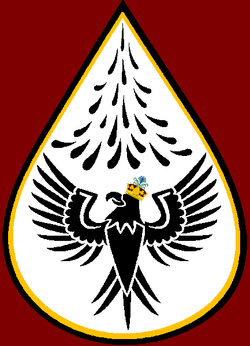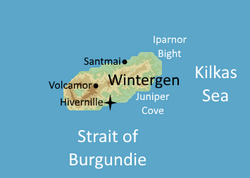Wintergen: Difference between revisions
mNo edit summary Tag: 2017 source edit |
mNo edit summary Tag: 2017 source edit |
||
| Line 102: | Line 102: | ||
}} | }} | ||
Wintergen ( | Wintergen ([[Burgoignesc language|Burg]]: Ouintergene), is an over-seas province of [[Burgundie]] located in the eastern [[Kilikas Sea]]. It shares a maritime border with [[Faneria]] to the southwest and [[Vithinja]] to the northeast. It is part of [[Burgundie]]'s [[Government of Burgundie#Constituent Countries|Burgoignesc Overseas Territory Assembly]]'s [[Geography of Burgundie#Wintergen|Polar Burgundies]] geographic designation. It is home to 319,990 to Ouintergens. It's capital and largest city is Hivernille which also serves as the province's largest port facility. Most of the island's residents live in one of three large settlements, Hivernille, Volcamor, or Santmai. The reminder of the island is kept uninhabited by the logging companies who own the vast majority of the land. | ||
Wintergen is known for its jagged, rocky Kilikas Sea coastlines; the extinct volcano in the western third of the island; the heavily forested interior; picturesque waterways; and its wild lowbush blueberries and seafood cuisine, especially lobster and clams. Santmai has emerged as a {{wp|Creative economy}} hub for [[Burgundie|Burgoignesc]], [[Vithinja]]n, and [[Faneria]]n yuppies. As a result, Santmai is experiencing a high degree of gentrification while Hivernille and Volcamor are considered grubby working-class towns. | |||
==Economy== | ==Economy== | ||
{{Further|Economy of Burgundie}} | {{Further|Economy of Burgundie}} | ||
Revision as of 23:12, 15 January 2024
Script error: The module returned a nil value. It is supposed to return an export table.
Wintergen
Ouintergene | |
|---|---|
Province of Burgundie | |
 COA of Wintergen | |
| Nickname: Evergreen Republic | |
 Map of Wintergen | |
| Nation | |
| Constituent Country | Burgoignesc Overseas Territory Assembly |
| Geographic designation | Polar Burgundies |
| Capital City | Hivernille |
| Area | |
| • Total | 6,215.971 km2 (2,400.000 sq mi) |
| Population | |
| • Total | 319,990 |
| • Density | 51/km2 (130/sq mi) |
| Demonym | Ouintergens |
| Website | www.burgundie.gouv/wintergen |
Wintergen (Burg: Ouintergene), is an over-seas province of Burgundie located in the eastern Kilikas Sea. It shares a maritime border with Faneria to the southwest and Vithinja to the northeast. It is part of Burgundie's Burgoignesc Overseas Territory Assembly's Polar Burgundies geographic designation. It is home to 319,990 to Ouintergens. It's capital and largest city is Hivernille which also serves as the province's largest port facility. Most of the island's residents live in one of three large settlements, Hivernille, Volcamor, or Santmai. The reminder of the island is kept uninhabited by the logging companies who own the vast majority of the land.
Wintergen is known for its jagged, rocky Kilikas Sea coastlines; the extinct volcano in the western third of the island; the heavily forested interior; picturesque waterways; and its wild lowbush blueberries and seafood cuisine, especially lobster and clams. Santmai has emerged as a Creative economy hub for Burgoignesc, Vithinjan, and Fanerian yuppies. As a result, Santmai is experiencing a high degree of gentrification while Hivernille and Volcamor are considered grubby working-class towns.
Economy
Wintergen's primary sectors are as a customs and logistical hub between the Kiravian trade markets and Burgoignesc markets, fishing, logging, and apple cultivation.
The apple varietals of Wintergen have been refined over the last 150 years to focus on apples that are desirable for cider and apple brandy, which, along with lumber, is Wintergen's primary export.
There are some minor oil reserves within the EEZ of Wintergen which are being tapped but the offshore drilling sector is comparatively small.
Wintergen is a strategic military hub and the bases are a major economic engine driving $438 million/year of ancillary, non-military financial activity.
Logging is the largest sector by land mass and employment on the island. 2/3rds of the island are covered in logging plantations that are operated by three companies: Irvine Timber Products, Roumeline Ltd., and Ouintergene Products. The primary species grown are softwoods, namely balsam fir and black spruce. The hardwood found in the region is mainly white birch.
Politics and government
Wintergen is part of the Burgoignesc Overseas Territory Assembly's Polar Burgundies geographic designation. Burgoignesc Overseas Territory Assembly is a constituent country equivalent of Burgundie with its own assembly, prime minister, budget, and laws. Burgundie's national governmental influence is limited to subsidies, education, and security, however, its financial and cultural institutes cast a long shadow across Wintergen.
Wintergen is a province within Burgoignesc Overseas Territory Assembly with its own semi-elected Governor-Epistates, representative legislative body, and court system.
Ouintergens are Burgoigniacs/Burgoignix with complete civil and economic rights, and citizenship (political rights) under the same federal service criteria as all residents of Burgundie. Burgoignesc is the official language but Coscivian and Burgoignesc are both in use.
Provincial executive
The provincial executive is the Governor-Epistates. Three candidates are elected by a single transferable vote election held every 5 years, the three candidates are presented to the Court of St. Alphador and the next Governor-Epistates is chosen from these candidates. If the citizenry rejects the selection, a run-off election is held with the remaining two candidates.
Provincial legislature
Like the Citizens Court of the National Assembly (Burg. La Assemblee de Ciutadans de l'Assemblee Nacional, ACAN), The Ouintergen Citizen's Court of the Provincial Assembly is a unicameral legislator. It makes provincial law, has the power of the provincial purse, and has the power of impeachment, by which it can remove sitting members of the provincial government. The Assembly has three seats for each province, one for the Burgoignesc Overseas Territory Assembly's Wintergen liaison, 3 for the clergy, 3 seats reserved for municipal leaders, and 3 for a rota of private business leaders. On 6 occasions throughout the year 3 more seats are opened to the public to debate topics that are not on the annual legislative agenda.
Law enforcement
Military installations
TBD
| TBD | |
|---|---|
| | |
| Site information | |
| Owner | Burgoignesc Security Forces |
| Operator | Navy of Burgundie |
| Controlled by | TBD |
| Condition | Operational |
| Site history | |
| Built | TBD |
| Garrison information | |
| Occupants | Navy
|
History
Wintergen is not known to have had a permanent population prior to the year 1000 anno Domini, though the Finnic peoples of Koskenkorva were aware of its existence and visited it sporadically for fishing purposes. It became known to Coscivian civilisation when it was sighted by Keður Valēkas' flagship during the return voyage of his first expedition to Great Kirav. A subsequent Coscivian expedition established a small settlement on the islands.
By the 19th century AD (XXXth century CC), most of Wintergen's small population lived in a handful of timber camps harvesting wood, most of which was exported to Burgundie to supply its prolific shipyards. Supplementary economic activities included fishing and subsistence farming, though the island suffered from poor soils and weather and a scarcity of arable land. Though some Coscivian families had lived on Wintergen for generations and spoke a unique (and now extinct) Coscivian dialect, most of the population were transient workers from Koskenkorva and the Far Northeast who lived on the island as fishermen and woodcutters for three or four seasons at most.
The 1820s a devastating bark beetle blight that almost eliminated the remaining forests on Burgundie. Desperate for more wood as the demand from timber-producing areas outstripped the local's ability to harvest it, some enterprising Port Diteauxoise shipwrights convinced the Burgoignesc North Levantine Trading Company (BNLTC) in 1823 to occupied the timber camps of Wintergen.
In 1836 the Golden Council of Ten decreed the Act of Economic Union, claiming that Wintergen was forevermore an integral part of Burgundie.
Following the island's capture and formalization into Burgundie, the Kiravian government and population were expelled. However, the conflicts with Burgundie bore on and [for some reason that I will maybe add here if applicable] were ultimately resolved in 1896 without settling the island's legal status.
Geography
Climate
Natural Hazards
Controversy
- The Flag Controversy and conflicting claims.
- Despite being illegal in Kiravia, abortion tourism is quietly on the rise. Because it is prosecutable under both Kiravian passport law (in federal court) and extraterritorial jurisdiction for Kiravian nationals (federal or provincial court) great pains are taken to conceal the true reason for the visit, and it has led to a rise in human smuggling in the Coscivian and Kilikas Seas. The Government of Burgundie has come out strongly against this practice and the Revenue Guard has increased its presence and anti-smuggling patrols in Wintergen and Nauta Normand as a result.
Demographics
See also
- Pages using duplicate arguments in template calls
- Pages with non-numeric formatnum arguments
- Pages using infobox settlement with bad settlement type
- Pages using infobox settlement with unknown parameters
- Pages using infobox settlement with no coordinates
- Pages using country topics with unknown parameters
- Burgundie
- Sub-national Regions in Burgundie
- KRV
- Islands
- Burgoignesc islands
- Disputed Territory
